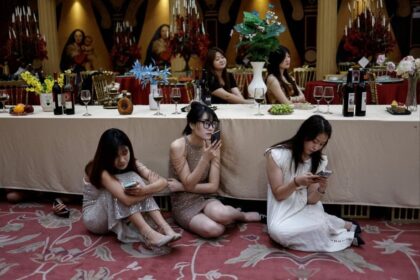The Inheritance Dispute That Gripped China
A seemingly routine inheritance dispute in Tianjin, China, has captured national attention and ignited debate about family, law, and tradition. What began as a brother and sister contesting a multimillion-yuan property ended with a revelation worthy of a television drama: neither sibling was the biological child of their late parents. The case, which unfolded in the Nankai District People’s Court in early 2025, has since gone viral, highlighting not only the emotional complexities of family but also the evolving landscape of inheritance law in modern China.
- The Inheritance Dispute That Gripped China
- How the Dispute Began: A Family’s Final Wishes
- The Courtroom Revelation: Both Siblings Are Adopted
- Legal Rights of Adopted Children in China
- Tradition vs. Law: Gender and Inheritance in China
- The Emotional Fallout: Family Secrets and Social Media Reactions
- Broader Implications: Adoption, Identity, and Modern Chinese Society
- In Summary
How the Dispute Began: A Family’s Final Wishes
The story centers on Sun, a Tianjin resident who passed away in March 2025, leaving behind a property valued at three million yuan (about Rs 3.6 crore or US$420,000). Before his death, Sun transferred full ownership of the home to his son. In a written statement, he explained his reasoning:
“Our daughter is adopted, but we have always treated her as our own. In our later years, it was our son who took care of us. We gave the house to him, and he intends to compensate his sister. We hope you two can get along like true siblings.”
The daughter, adopted in 1966, was promised fair compensation. However, she challenged the transfer, arguing that only her father had signed the property papers and that her late mother’s share should also be included in the estate. This disagreement set the stage for a legal battle that would soon take an unexpected turn.
The Siblings’ Relationship: Estrangement and Caregiving
Family dynamics played a significant role in the dispute. The brother claimed that his sister had severed ties with the family in the 1990s after a previous property disagreement, leaving him as the sole caregiver for their aging parents. The sister, meanwhile, insisted on her right to a share of the inheritance, believing the property transfer was incomplete without her mother’s signature. These tensions, rooted in decades-old grievances, resurfaced in court as both siblings sought what they believed was rightfully theirs.
The Courtroom Revelation: Both Siblings Are Adopted
During the court proceedings, the sister presented a bombshell piece of evidence: her brother’s household registration documents, which listed him as “adopted.” Until that moment, the brother had believed he was the biological son. The revelation stunned the courtroom and reportedly caused the brother to break down in tears. It was now clear that neither sibling was biologically related to their late parents—a fact that had been kept secret for decades.
This twist added a new layer of complexity to the case. While the brother struggled with the emotional impact of the discovery, the legal question remained: did adoption affect their rights to inherit?
Legal Rights of Adopted Children in China
China’s Civil Code is clear: adopted children have the same legal rights as biological children when it comes to inheritance. The judge in the Tianjin case clarified this point, stating that both siblings were entitled to inherit from their adoptive parents. This legal principle is designed to ensure equality and protect the interests of adopted children, regardless of blood relation.
However, the court also noted a crucial detail: the property in question had been officially transferred to the brother and notarized in 2007, well before their father’s death. As a result, the house was no longer considered part of the estate and was not subject to division as inheritance. This technicality ultimately shaped the court’s decision.
The Settlement: Mediation and Compensation
After three hours of intensive mediation, the siblings reached a settlement. The brother would retain ownership of the property but was ordered to pay his sister 550,000 yuan (about Rs 66 lakh or US$76,000) as compensation. The court’s ruling balanced the father’s wishes, the legal status of the property, and the siblings’ rights as adopted children.
Tradition vs. Law: Gender and Inheritance in China
While China’s laws now guarantee equal inheritance rights for sons and daughters—whether biological or adopted—traditional customs often tell a different story. In many Chinese families, especially in rural areas, property and land are still passed preferentially to sons. Daughters, even when legally entitled, may be sidelined or pressured to relinquish their claims for the sake of family harmony.
This case brought those tensions into the spotlight. Despite the law’s support for equal rights, the father’s decision to transfer the property solely to his son reflected a common cultural preference. His written request for the son to “reasonably compensate” his sister was an attempt to balance tradition with fairness, but it also left room for dispute.
Changing Attitudes: The Rise of Wills and Legal Planning
Inheritance disputes like this one are becoming more common in China as property values soar and families become more complex. According to the China Will Registration Center, the average age of people making wills has steadily declined, reaching 67.71 years in 2024. Legal experts say that drafting a will and using government-run notary offices are the best ways to prevent family conflicts.
Yao Junchang, co-founder of W&H Law Firm in Beijing, explained, “Preventing family disputes over inheritance is why most people make wills. Using a government-run notary office is the safest way to guarantee a will’s legal validity.”
The Emotional Fallout: Family Secrets and Social Media Reactions
The revelation that both siblings were adopted added an emotional dimension to the legal battle. The brother’s shock and distress in court were widely reported, and the case quickly went viral on Chinese social media. Many users compared the story to a television drama, expressing sympathy for the siblings and debating the fairness of the outcome.
Some commentators noted that the sister had known about her own adoption but not her brother’s, which may have contributed to their estrangement. Others pointed out that the parents’ secrecy, while perhaps intended to protect the children, ultimately led to greater pain and confusion.
Lessons for Families: The Importance of Communication and Planning
This case serves as a cautionary tale for families everywhere. Secrets, unclear paperwork, and unspoken expectations can turn even the closest relationships into battlegrounds. Legal experts and financial advisors recommend the following steps to avoid similar disputes:
- List all assets, including property, valuables, bank accounts, insurance, and annuities.
- List all debts and obligations.
- Review and update beneficiary details on retirement accounts and insurance policies.
- Choose a trusted estate administrator.
- Write a clear will, outlining asset distribution and guardianship plans.
- Review and update documents regularly.
- Share your will with your administrator and store a copy securely.
- Consult a financial advisor for complex estates.
Broader Implications: Adoption, Identity, and Modern Chinese Society
Beyond the legal and financial aspects, the Tianjin inheritance case raises important questions about adoption, identity, and family in contemporary China. Adoption has long carried a social stigma in some communities, leading many families to keep it secret from their children. Yet, as this case shows, such secrets can have profound consequences when they eventually come to light.
At the same time, the case highlights the progress China has made in protecting the rights of adopted children. The law’s insistence on equal treatment, regardless of blood relation, is a significant step toward fairness and inclusion. However, changing deep-seated cultural attitudes remains a work in progress.
Inheritance Disputes: A Global Challenge
While this story unfolded in a Chinese courtroom, the emotions and challenges it reveals are universal. Inheritance battles can tear families apart in any country, especially when expectations clash with legal realities. The key, experts say, is clear communication, proper legal planning, and a willingness to put family relationships above material gain.
In Summary
- A brother and sister in Tianjin, China, discovered they were both adopted while disputing a three-million-yuan (Rs 3.6 crore) inheritance.
- Their father had transferred the property to his son before his death, asking him to compensate his adopted sister.
- The sister challenged the transfer, arguing her mother’s share should also be included in the estate.
- During court proceedings, it was revealed that both siblings were adopted, causing emotional distress.
- Chinese law grants adopted children equal inheritance rights, but the property had already been legally transferred and was not part of the estate.
- The court mediated a settlement: the brother kept the house and paid his sister 550,000 yuan (about Rs 66 lakh) in compensation.
- The case highlights the tension between modern law and traditional customs, which often favor sons in inheritance matters.
- Experts recommend clear legal planning and open communication to prevent similar disputes in the future.












